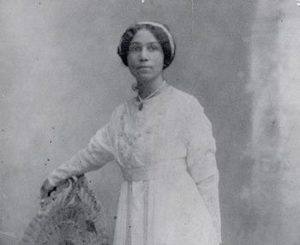
Anne Spencer
*Anne Spencer was born on this date in 1882. She was a Black poet.
Annie Bethel Bannister, the only child of Joel Cephus Bannister and Sarah Louise Scales, was from Henry County, Virginia. After a turbulent marriage ended, young Anne was taken to Bramwell, West Virginia. Money problems forced Anne’s mother to place her in the home of William T. Dixie, a prominent member of the Black community. Reading dime-store novels and newspapers taught the gifted youngster the power of language.
While illiterate, Anne’s mother sent her daughter to the Virginia Seminary in Lynchburg, where she graduated in 1899. During these academic years, Anne met their classmate, Edward Spencer. The couple married on May 15, 1901, and had three children. While Spencer befriended many Harlem Renaissance personalities, her most rewarding relationship was with James Weldon Johnson. Not only did he discover her, but he also selected her pen name, Anne Spencer.
Johnson also introduced her to H. L. Mencken, who helped Spencer publish her first poem, Before the Feast at Shushan. She later declined his patronage. Spencer published most of her poems during the 1920s in the period's most prestigious collections. Other authors and examples are James Weldon Johnson's The Book of American Negro Poetry (1922); Robert T. Kerlin's Negro Poets and Their Poems (1923); Louis Untermeyer's American Poetry Since 1900 (1923); Alain Locke's The New Negro (1925); and Countee Cullen's Caroling Dusk (1925). One of Spencer’s last poems, For Jim, Easter Eve, was published in Langston Hughes and Arna Bontemps's The Poetry of the Negro, 1746-1949, in 1948.
Many of Spencer's poems convey a romantic concern with the human search for beauty and meaning in a disgusting world and people's wasted attempts to enforce order on God's earth. Poems in this frame of mind include At the Carnival and Change. However, Spencer can be viewed as accomplished in other styles. Black Man O' Mine celebrates Black love. While Spencer did not write "protest" poetry, she was aware of white oppression.
The character of White Things symbolically addresses racism. She worked passionately with the NAACP and helped set up the Lynchburg chapter of that organization in 1918. Spencer cultivated a garden that attracted several members of the Black artistic community for over half a century: W. E. B. Du Bois, Langston Hughes, Georgia Douglas Johnson, Paul Robeson, Gwendolyn Brooks, Maya Angelou, and others visited her Lynchburg home.
Many of her writings were lost, but reviewers continued rediscovering her in the latter half of the twentieth century. Examples of this are J. Lee Greene's Time's Unfading Garden: Anne Spencer’s Life and Poetry (1977). Gloria T. Hull, Afro-American Women Poets: A Bio-Critical Survey, in Sandra Gilbert and Susan Gubar, eds., Shakespeare's Sisters (1979). Echoes from the Garden: The Anne Spencer Story, a documentary film (1980). Erlene Stetson, ed., Black Sister: Poetry by Black American Women, 1746-1980 (1981). Maureen Honey, ed., Shadowed Dreams: Women’s Poetry of the Harlem Renaissance (1989). Keith Clark, Anne Spencer: Poet, Librarian, in Notable Black American Women, ed. Jessie Carney Smith (1992).
Anne Spencer died in 1975.
The Vintage Book of African American Poetry
Edited and with Introduction by Michael S. Harper & Anthony Walton
Copyright 2000
Vintage Books, Random House Ind., New York
ISBN 0-375-70300-7
The Oxford Companion to Women’s Writing in the United States.
Ed. Cathy N. Davidson, Linda Wagner-Martin.
New York: Oxford University Press, 1995.
Copyright © 1995 by Oxford University Press.